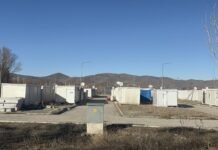
Sweden on Tuesday allocated an additional 30 million SEK ($2.8 million) in humanitarian aid to areas affected by a deadly earthquake that killed thousands in Turkey and Syria, in addition to the 7 million SEK ($660,000) announced on Monday.
At a press conference on Tuesday evening, Minister for Civil Defense Carl-Oskar Bohlin and Minister for International Development Cooperation and Foreign Trade Johan Forssell announced Sweden’s additional emergency aid to Turkey and Syria.
The ministers said 20 million SEK will be transferred to the International Federation of Red Cross and Red Crescent Societies (IFRC) and 10 million SEK to the UN Central Emergency Response Fund to support their initial operations in the area hit by the earthquake.
Sweden has also sent civil engineers and IT and logistics experts to Turkey through the EU Civil Protection Mechanism, according to the ministers.
Bohlin and Forssell said the decision was based on needs assessments by Swedish humanitarian actors already present in the earthquake-affected area.
They also announced that the government has decided to authorize the Swedish Civil Contingencies Agency to provide additional assistance to Turkey through NATO to create a new channel of support for earthquake victims.
“Sweden wants to provide the help that Turkey is asking for. The first group of Swedish personnel flew to Turkey 24 hours after the earthquake. The decision to allow aid through NATO creates more opportunities to help Turkey in this extremely vulnerable situation,” Bohlin said.
The Swedish government is closely monitoring developments and stands ready to continue supporting those in need in Turkey and Syria, according to Bohlin and Forssell.
A magnitude-7.8 earthquake struck Turkey and Syria in the early morning hours of Monday, followed by numerous aftershocks and a magnitude-7.5 temblor some nine hours later, that killed more than 11,200 people, leveled buildings while many were still asleep and triggered tremors felt as far away as Egypt and the island of Cyprus.
It was one of the most powerful to hit the region in at least a century, affecting southeastern parts of Turkey that are home to millions of refugees from Syria and other war-torn parts of the world.
The emergency service in Turkey put the initial death toll at 8,574, although it threatened to climb substantially because the nighttime disaster had flattened dozens of apartment blocks across major cities.
At least 2,662 people also died in government-controlled parts of Syria, as well as the northern areas held by pro-Turkish factions, according to the health ministry and a local hospital.
Turkey has declared a level-four emergency and asked for international assistance through the EU’s Emergency Response Coordination Centre.
Twenty EU member states and two candidate countries have offered 29 search and rescue teams and five emergency medical teams. According to the EU’s Directorate-General for European Civil Protection and Humanitarian Aid Operations 1,485 rescuers and 100 search dogs were sent to Turkey in total by February 8.
Update: Türkiye #earthquake and #EUCivilProtection operations on the ground:
20 EU countries 🇦🇹🇧🇪🇧🇬🇭🇷🇨🇿🇨🇾🇪🇪🇫🇷🇬🇷🇩🇪🇭🇺🇮🇹🇲🇹🇳🇱🇵🇱🇵🇹🇷🇴🇸🇰🇸🇮🇪🇸 and 🇦🇱🇲🇪🇷🇸 have offered 29 search & rescue and 5 medical teams.
In total, 1485 rescuers & 100 search dogs 🐕🦺 have been mobilised to save lives. pic.twitter.com/yMyWK9rhef
— EU Civil Protection & Humanitarian Aid 🇪🇺 (@eu_echo) February 8, 2023














